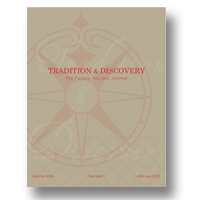|
contents |
|
1.
|
Tradition and Discovery: The Polanyi Society Periodical:
Volume >
31 >
Issue: 3
Preface
view |
rights & permissions
| cited by
|
|
|
|
|
2.
|
Tradition and Discovery: The Polanyi Society Periodical:
Volume >
31 >
Issue: 3
News and Notes
view |
rights & permissions
| cited by
|
|
|
|
|
3.
|
Tradition and Discovery: The Polanyi Society Periodical:
Volume >
31 >
Issue: 3
Information on Polanyi Society Electronic Discussion List
view |
rights & permissions
| cited by
|
|
|
|
|
4.
|
Tradition and Discovery: The Polanyi Society Periodical:
Volume >
31 >
Issue: 3
Tradition and Discovery Digital Archives
view |
rights & permissions
| cited by
|
|
|
|
|
5.
|
Tradition and Discovery: The Polanyi Society Periodical:
Volume >
31 >
Issue: 3
Submissions for Publication
view |
rights & permissions
| cited by
|
|
|
|
|
6.
|
Tradition and Discovery: The Polanyi Society Periodical:
Volume >
31 >
Issue: 3
2005 Polanyi Society Annual Meeting
view |
rights & permissions
| cited by
|
|
|
|
|
articles |
|
7.
|
Tradition and Discovery: The Polanyi Society Periodical:
Volume >
31 >
Issue: 3
Dale Cannon
“Longing to Know If Our Knowing Really Is Knowing”:
Reflections on Esther Meek’s Longing to Know: The Philosophy of Knowledge for Ordinary People
abstract |
view |
rights & permissions
| cited by
These reflections summarize and critically respond to Esther Meek’s Longing to Know: The Philosophy of Knowledge for Ordinary People (Grand Rapids, MI: Brazos Press/Baker Book House, 2003. Pp. 208.$16.99. ISBN 1-58743-060-6). The book seeks to explain on the basis ofthe ideas of Michael Polanyi how ordinary acts of knowing happen to work, how they are indeed instances of genuine knowing, and, incomparison with them, how knowing God can possibly work and be a live possibility. Meek’s argument’s most vulnerable premise is its unquestioned acceptance of Scripture as an authoritative guide, which directly raises the question whether Meek’s position is fully post-critical in the sense identified by Polanyi, and indirectly raises the question how Meek is able to handle religious pluralism.
|
|
|
|
|
8.
|
Tradition and Discovery: The Polanyi Society Periodical:
Volume >
31 >
Issue: 3
David W. Rutledge
“Knowing as Unlocking the World”:
A Review Essay on E. L. Meek’s Longing to Know: The Philosophy of Knowledge for Ordinary People
abstract |
view |
rights & permissions
| cited by
This review essay begins by describing why one should read Esther Meek’s Longing to Know: The Philosophy of Knowledge for Ordinary People (Brazos Press, 2003), then raises questions about the absence of tragedy in her view of knowledge; how ordinary knowledge of things differs from knowledge of God; whether one can “prove“ the Messianic nature of Jesus; and whether Meek’s inclusive epistemology can support an exclusivistic soteriology.
|
|
|
|
|
9.
|
Tradition and Discovery: The Polanyi Society Periodical:
Volume >
31 >
Issue: 3
Esther L. Meek
Longing to Know and the Complexities of Knowing God
abstract |
view |
rights & permissions
| cited by
This response to papers on my 2003 book, Longing to Know, presented at the Polanyi Society’s November 2004 meetings, addresses two primary concerns about the book’s argument: first, that the book’s argument depends on an inappropriately unquestioned commitment to the authority of Scripture that falls short of the adjustment required by modern higher critical biblical scholarship; and second, that the book’s argument implies a religious exclusivism that overlooks the fact that the model of knowing it defends suits competing religious positions equally well. I argue that LTK’s strategy is more sophisticated than has been represented, and that the commitment to Scripture as an authoritative guide in knowing God, as over against the commitment to modem higher critical scholarship, may be reasonably justified as a consistent elucidation of the Polanyian model of knowing. I argue that, indeed, the Polanyian model of knowing may be applied to or by competing religious claims, where the claim that we must treat all such claims as having equal validity must itself be treated as a religious claim. In fact, Polanyi’s argument about competing scientific claims makes more sense of how we may (yea, must) maintain the rightness of our own position while acknowledging respectfully the disagreements of others.
|
|
|
|
|
contents |
|
10.
|
Tradition and Discovery: The Polanyi Society Periodical:
Volume >
31 >
Issue: 3
Notes on Contributors
view |
rights & permissions
| cited by
|
|
|
|
|
11.
|
Tradition and Discovery: The Polanyi Society Periodical:
Volume >
31 >
Issue: 3
WWW Polanyi Resources
view |
rights & permissions
| cited by
|
|
|
|
|
12.
|
Tradition and Discovery: The Polanyi Society Periodical:
Volume >
31 >
Issue: 3
Polanyi Society Membership
view |
rights & permissions
| cited by
|
|
|
|
|
reviews |
|
13.
|
Tradition and Discovery: The Polanyi Society Periodical:
Volume >
31 >
Issue: 3
Barbara Baumgarten
God and the Creative Imagination:
Metaphor, Symbol and Myth in Religion and Theology
view |
rights & permissions
| cited by
|
|
|
|
|
14.
|
Tradition and Discovery: The Polanyi Society Periodical:
Volume >
31 >
Issue: 3
C.P. Goodman
Mind & Emergence:
From Quantum to Consciousness
view |
rights & permissions
| cited by
|
|
|
|





